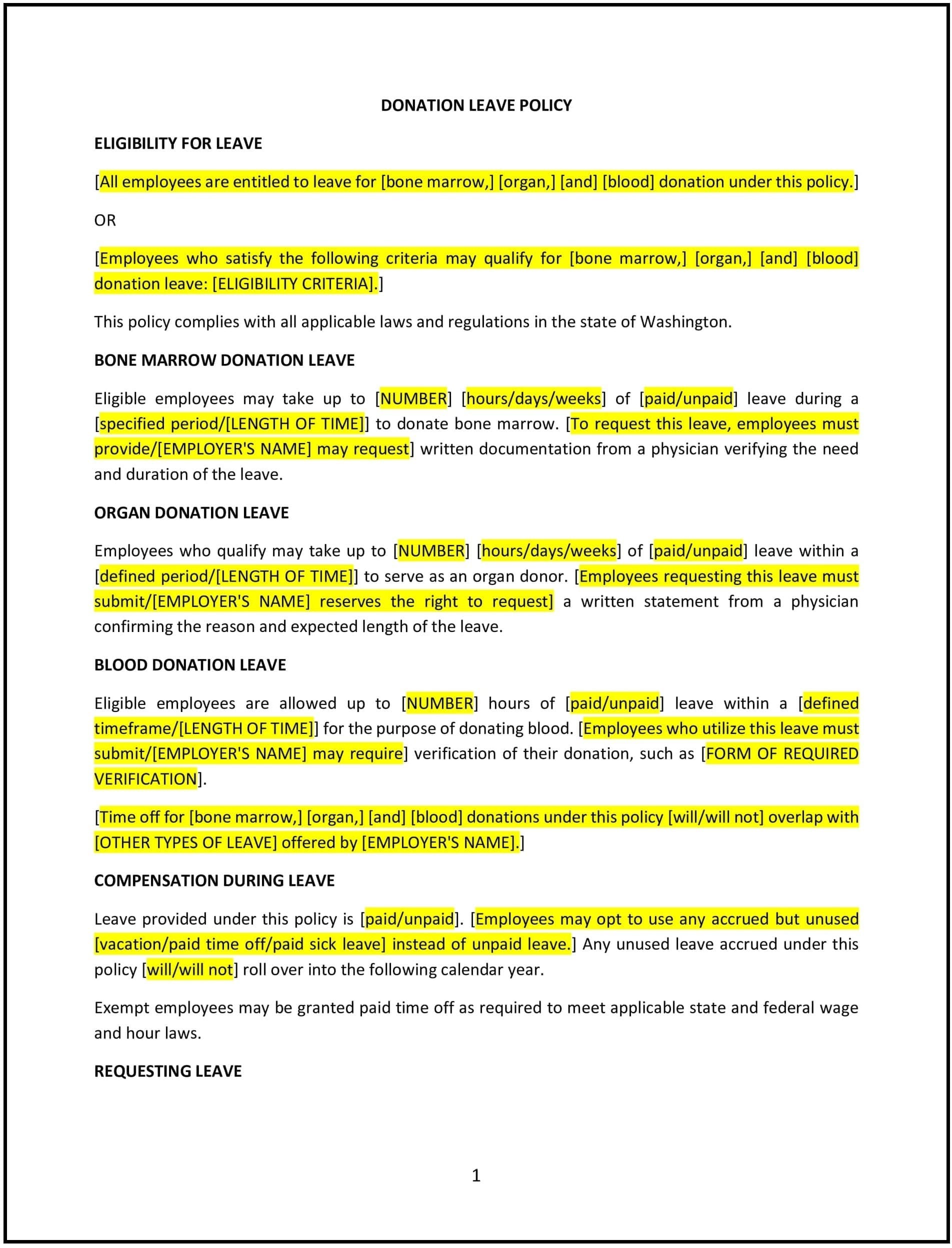Got contracts to review? While you're here for policies, let Cobrief make contract review effortless—start your free review now.

Customize this template for free
This donation leave policy is designed to help Washington businesses encourage employees to engage in charitable activities while balancing their work responsibilities. The policy outlines the company’s commitment to offering paid or unpaid leave for employees who wish to volunteer or donate time to charitable causes. It provides the guidelines and procedures for requesting donation leave and ensures that employees can contribute to community service while maintaining productivity in their professional roles.
By adopting this policy, businesses can demonstrate corporate social responsibility, improve employee satisfaction, and promote a positive company culture that values community engagement.
How to use this donation leave policy (Washington)
- Define donation leave eligibility: Clearly specify which employees are eligible for donation leave, including full-time, part-time, and temporary employees. Include any minimum tenure or performance requirements that must be met before employees can take advantage of this benefit.
- Specify the amount of donation leave: Outline the amount of time off employees are allowed to take for donation leave, including whether it is a set number of hours or days per year. This could vary based on the employee’s position or length of service with the company.
- Clarify the types of eligible activities: Specify which charitable activities qualify for donation leave, such as volunteering at nonprofit organizations, participating in community service events, or assisting in fundraising campaigns. The policy should clarify whether the activities must be within a specific geographic area or support a registered charitable organization.
- Establish the approval process: Provide a clear procedure for requesting donation leave, including the steps employees need to follow to obtain approval. This may include submitting a leave request form, providing documentation of the charitable activity, and receiving approval from a supervisor or HR department.
- Address paid or unpaid leave: The policy should indicate whether donation leave will be paid or unpaid. If paid, the company should specify the rate of pay (e.g., regular hourly rate). If unpaid, the policy should clarify whether employees may use paid time off (PTO) or vacation days in conjunction with donation leave.
- Set guidelines for coordination with work duties: Ensure that employees coordinate with their managers to minimize disruptions to work. The policy should emphasize that donation leave should not interfere with essential job functions or business operations and that adequate planning should be made in advance.
- Promote compliance with Washington and federal laws: The policy should promote compliance with Washington state and federal labor laws, ensuring that employees are treated fairly and consistently when requesting donation leave. This may include complying with applicable wage and hour laws, as well as ensuring that employees do not face discrimination for taking donation leave.
- Review and update regularly: Periodically review and update the policy to ensure it remains compliant with changes in Washington state laws, federal regulations, or business operations. Regular updates will help keep the policy relevant and effective.
Benefits of using this donation leave policy (Washington)
This policy offers several benefits for Washington businesses:
- Enhances corporate social responsibility: By offering donation leave, businesses can demonstrate a commitment to community engagement and social responsibility, strengthening their relationship with customers, employees, and the local community.
- Improves employee morale: Employees appreciate having the opportunity to contribute to causes they care about, which can lead to higher job satisfaction and a sense of fulfillment. This policy fosters a culture of giving and makes employees feel valued by the company.
- Attracts and retains talent: Offering donation leave can make a business more attractive to potential employees who value giving back to the community. It can also increase employee loyalty, contributing to higher retention rates.
- Strengthens company reputation: Companies that actively encourage charitable participation enhance their reputation as responsible, community-oriented organizations. This can increase brand loyalty and attract customers who value corporate social responsibility.
- Supports employee work-life balance: Donation leave helps employees manage their time between work and charitable activities, contributing to a better work-life balance. It shows that the company values its employees’ personal interests and community involvement.
- Promotes positive company culture: The policy encourages employees to be socially conscious and engaged, promoting a positive work culture and a sense of purpose within the organization.
Tips for using this donation leave policy (Washington)
- Communicate the policy clearly: Ensure that all employees are aware of the donation leave policy and understand how to request leave for charitable activities. Include the policy in the employee handbook and review it during onboarding.
- Encourage participation: Promote the policy internally to encourage employees to take advantage of donation leave. This can be done through company newsletters, emails, or by organizing company-wide volunteer events.
- Coordinate with managers: Employees should coordinate with their managers to ensure that their absence for donation leave does not disrupt business operations. Encourage employees to plan their donation leave in advance and provide reasonable notice.
- Track participation: Consider keeping records of donation leave usage to track how often employees use the benefit and which causes they support. This can help the company measure the impact of its donation leave program and identify trends or areas for improvement.
- Review and update regularly: Periodically review the policy to ensure it remains compliant with Washington state laws, federal regulations, and any changes in the company’s operations or employee needs. Regular updates will help ensure the policy stays relevant and effective.